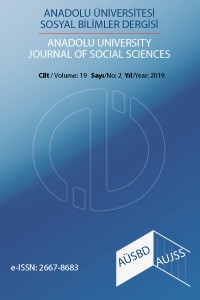What are the Main Determinants of Renewable Energy Consumption? A Panel Threshold Regression Approach
Öz
Because of severe environmental impacts associated with the use of conventional energy sources, most of the countries attempt to decarbonize their energy sector by increasing share of renewable energy in their total energy consumption which also reduces their energy import dependency. Therefore, this study aims to understand the determinants of renewable energy consumption for 58 countries over the period from 1990 to 2012. The period and number of countries are determined based on the data availability for all the variables. For example, data on total greenhouse gas emissions is available only up to 2012. Analysis is based on a panel threshold regression model to find out asymmetric behavior of renewable energy consumption. The model explains renewable energy consumption by various economic factors in a nonlinear framework. Different effects of these factors are expected under different economic regimes characterized by income level. Results show that for real GDP per capita lower than 1527.977 US$, signs, statistical significance and magnitude of coefficients on some variables differ tremendously compared to the upper regime verifying the asymmetric relationship. Therefore, one can conclude that determinants of renewable energy consumption differ across countries and time based on the real GDP per capita level.
Anahtar Kelimeler
Renewable Energy Consumption Panel Threshold Regression Model
Kaynakça
- Ackah, I., & Kizys, R. (2015). Green growth in oil producing African countries: A panel data analysis of renewable energy demand. Renewable and Sustainable Energy Reviews, 50, 1157-1166. doi:https://doi.org/10.1016/j.rser.2015.05.030
- Aguirre, M., & Ibikunle, G. (2014). Determinants of renewable energy growth: A global sample analysis. Energy Policy, 69, 374-384.
- Akar, B. G. (2016). The Determinants Of Renewable Energy Consumption: An Empirical Analysis For The Balkans. European Scientific Journal, 12(11), 594-607. doi:10.19044/esj.2016.v12n11p594
- Apergis, N., & Payne, J. E. (2014a). The causal dynamics between renewable energy, real GDP, emissions and oil prices: evidence from OECD countries. Applied Economics, 46(36), 4519-4525. doi:10.1080/00036846.2014.964834
- Apergis, N., & Payne, J. E. (2014b). Renewable energy, output, CO2 emissions, and fossil fuel prices in Central America: Evidence from a nonlinear panel smooth transition vector error correction model. Energy Economics, 42, 226-232. doi:https://doi.org/10.1016/j.eneco.2014.01.003
- Bengochea, A., & Faet, O. (2012). Renewable energies and CO2 emissions in the European Union. Energy Sources, Part B: Economics, Planning, and Policy, 7(2), 121-130. doi:10.1080/15567240902744635
- Bird, L., Bolinger, M., Gagliano, T., Wiser, R., Brown, M., & Parsons, B. (2005). Policies and market factors driving wind power development in the United States. Energy Policy, 33(11), 1397-1407. https://doi.org/10.1016/j.enpol.2003.12.018
- Candelon, B., Colletaz, G., & Hurlin, C. (2013). Network effects and infrastructure productivity in developing countries. Oxford Bulletin of Economics and Statistics, 75(6), 887-913. doi:10.1111/j.1468-0084.2012.00722.x
- Carley, S. (2009). State renewable energy electricity policies: An empirical evaluation of effectiveness. Energy Policy, 37(8), 3071-3081. doi:http://dx.doi.org/10.1016/j.enpol.2009.03.062
- Chang, T. H., Huang, C. M., & Lee, M. C. (2009). Threshold effect of the economic growth rate on the renewable energy development from a change in energy price: Evidence from OECD countries. Energy Policy, 37(12), 5796-5802.
- da Silva, P. P., Cerqueira, P. A., & Ogbe, W. (2018). Determinants of renewable energy growth in Sub-Saharan Africa: Evidence from panel ARDL. Energy, 156, 45-54. doi:https://doi.org/10.1016/j.energy.2018.05.068
- Gan, J. B., & Smith, C. T. (2011). Drivers for renewable energy: A comparison among OECD countries. Biomass & Bioenergy, 35(11), 4497-4503. doi:10.1016/j.biombioe.2011.03.022
- Kim, J., & Park, K. (2016). Financial development and deployment of renewable energy technologies. Energy Economics, 59, 238-250. doi:https://doi.org/10.1016/j.eneco.2016.08.012
- Marques, A. C., & Fuinhas, J. A. (2011). Drivers promoting renewable energy: A dynamic panel approach. Renewable & Sustainable Energy Reviews, 15(3), 1601-1608. doi:10.1016/j.rser.2010.11.048
- Marques, A. C., & Fuinhas, J. A. (2012). Are public policies towards renewables successful? Evidence from European countries. Renewable Energy, 44, 109-118. doi:https://doi.org/10.1016/j.renene.2012.01.007
- Marques, A. C., Fuinhas, J. A., & Pires Manso, J. R. (2010). Motivations driving renewable energy in European countries: A panel data approach. Energy Policy, 38(11), 6877-6885. doi:http://dx.doi.org/10.1016/j.enpol.2010.07.003
- Omri, A., Daly, S., & Nguyen, D. K. (2015). A robust analysis of the relationship between renewable energy consumption and its main drivers. Applied Economics, 47(28), 2913-2923.
- Omri, A., & Nguyen, D. K. (2014). On the determinants of renewable energy consumption: International evidence. Energy, 72, 554-560. doi:https://doi.org/10.1016/j.energy.2014.05.081
- Pfeiffer, B., & Mulder, P. (2013). Explaining the diffusion of renewable energy technology in developing countries. Energy Economics, 40, 285-296. doi:https://doi.org/10.1016/j.eneco.2013.07.005
- REN21. (2014). Renewables 2014 Global Status Report. Paris: REN21 Secretariat.
- REN21. (2015). Renewables 2015 Global Status Report. Paris: REN21 Secretariat.
- REN21. (2017). Renewables 2017 Global Status Report. Paris: REN21 Secretariat.
- Sadorsky, P. (2009a). Renewable energy consumption and income in emerging economies. Energy Policy, 37(10), 4021-4028. doi:http://dx.doi.org/10.1016/j.enpol.2009.05.003
- Sadorsky, P. (2009b). Renewable energy consumption, CO2 emissions and oil prices in the G7 countries. Energy Economics, 31(3), 456-462. doi:http://dx.doi.org/10.1016/j.eneco.2008.12.010
- Salim, R. A., & Rafiq, S. (2012). Why do some emerging economies proactively accelerate the adoption of renewable energy? Energy Economics, 34(4), 1051-1057. doi:https://doi.org/10.1016/j.eneco.2011.08.015
- Sawin, J. (2004). National policy instruments: Policy lessons for the advancement and diffusion of renewable energy technologies around the world. (Thematic Background Paper). International Conference for Renewables, Bonn.
Ayrıntılar
| Birincil Dil | Türkçe |
|---|---|
| Bölüm | Makaleler |
| Yazarlar | |
| Yayımlanma Tarihi | 17 Haziran 2019 |
| Gönderilme Tarihi | 13 Haziran 2018 |
| Yayımlandığı Sayı | Yıl 2019 Cilt: 19 Sayı: 2 |
Cited By
Identifying the factors that drive renewable energy consumption in the MENA region
Business Economics and Management Research Journal
https://doi.org/10.58308/bemarej.1230694
Bu eser Creative Commons Atıf-GayriTicari 4.0 Uluslararası Lisansı ile lisanslanmıştır.


